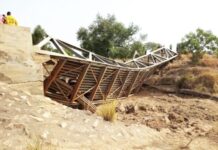In the past year, Ghana’s Parliament seized global attention– twice for violence. First, in the choice of Speaker and then for the e-Levy vote at the end of the year. According to a probably apocryphal story, the day after the second brawl, an aspiring Parliamentary candidate called on a Constituency executive to make his intentions known. The Constituency executive sized up the diminutive aspiring MP and said, “Massa, wo mfe susua. Parliament ho, sesei de3, yenka brofo, y3bo aky3de3. Wo betumi ako de3?”
It is strange that the year after President Agyewodin Rawlings joined his ancestors, the defining characteristic he brought to our politics — violence–is on the ascendancy. Even during his term, there were no brawls in our Parliament. While he punched up his Vice-president, at the Castle, Parliament knew to resolve its differences ” by the force of arguments rather than the argument of force.”
Since the advent of the 1992 constitution, violence has been trending downwards in our politics, except for a few aberrations– like Kume Preko and Kumbungu but in the last year, the trend has reversed. First, we had some by-elections characterized by violence. Then in 2020, seven of our fellow citizens left home to vote and ended up dead at the hands of our security forces in an election described bizarrely by our own Electoral Commission as “peaceful”. Indeed, the deaths in 2020 made that election more violent than the January 13th, 1972 coup. Some apologists for Agyewodin Rawlings, watching the events after his death, suggest that President Rawlings didn’t bring violence, he only unleashed the violence that was hidden within us.
A cardinal feature of a democracy is the absence of violence and the ability to resolve differences through debate and compromise.
Three events towards the end of the year should give us hope.
When the Speaker returned to address a divided Parliament, he chose to calm the riled tempers rather than inflame them.
Then Gabby, as an emissary for the President, visited former President Mahama, who received him cordially.
Finally, former President Kufuor, in an interview with Kesben fm, called for “Abotare” and “Ahobrase3”.
These were hopeful steps and we must build on them. We must investigate violence, call out the perpetrators and deal with them.
If the Parliament and other organs continue to be violent, sooner or later, others who are better equipped for violence will step forward– to institutionalize violence to our collective detriment.
Let us not tempt them or fate.
Let there be peace.
May God bless Ghana.
Arthur Kobina Kennedy
2nd January, 2022.















